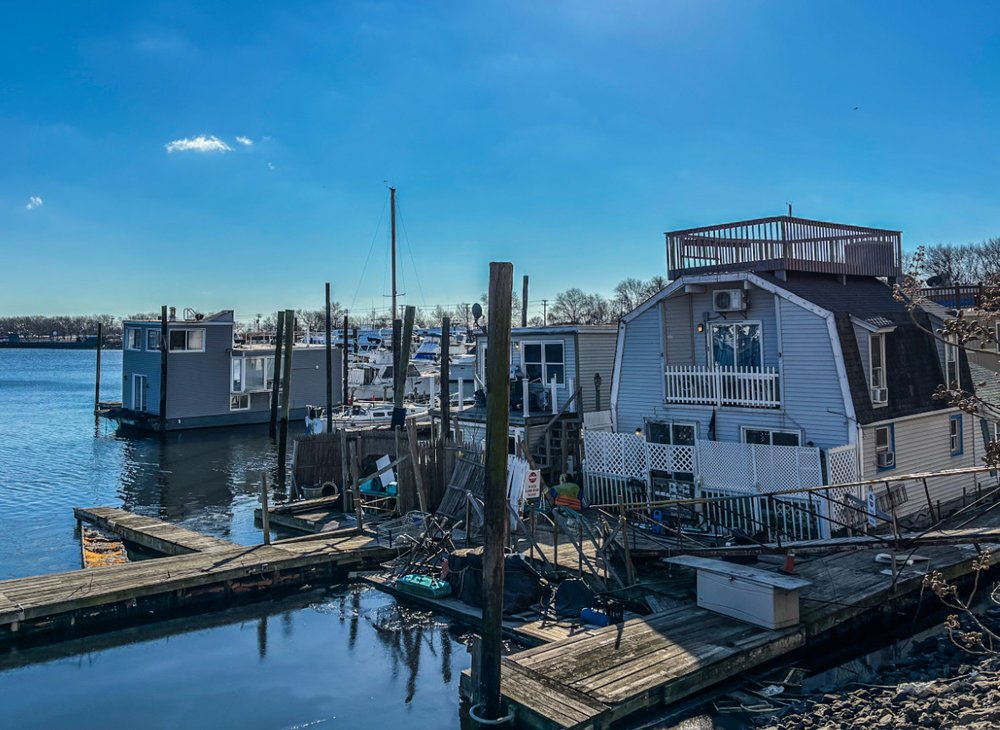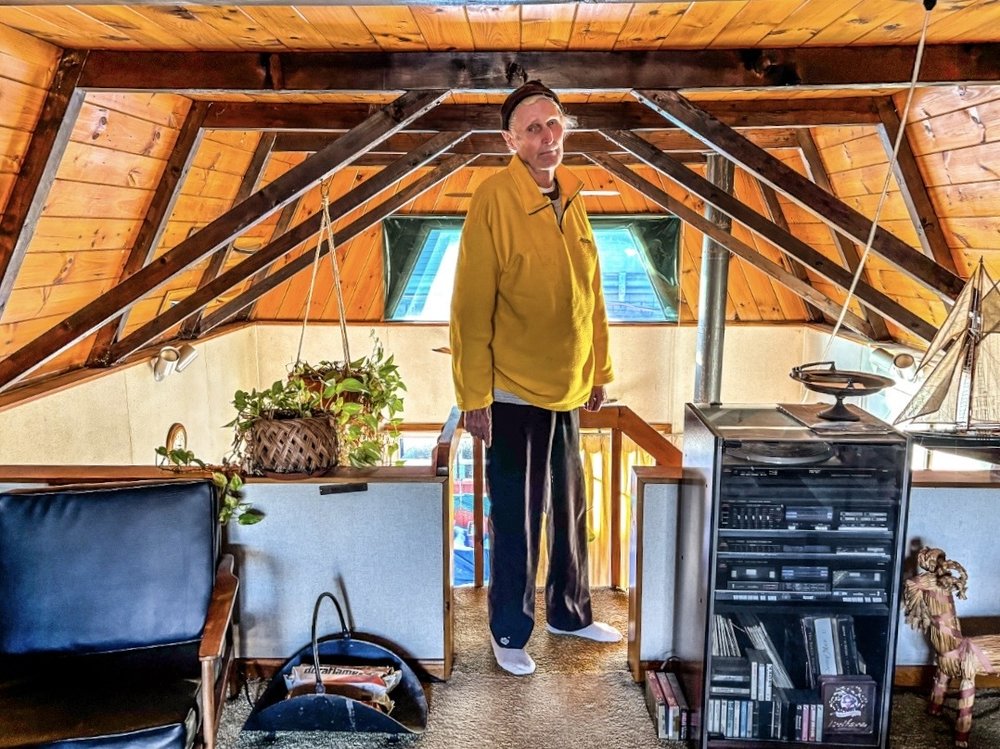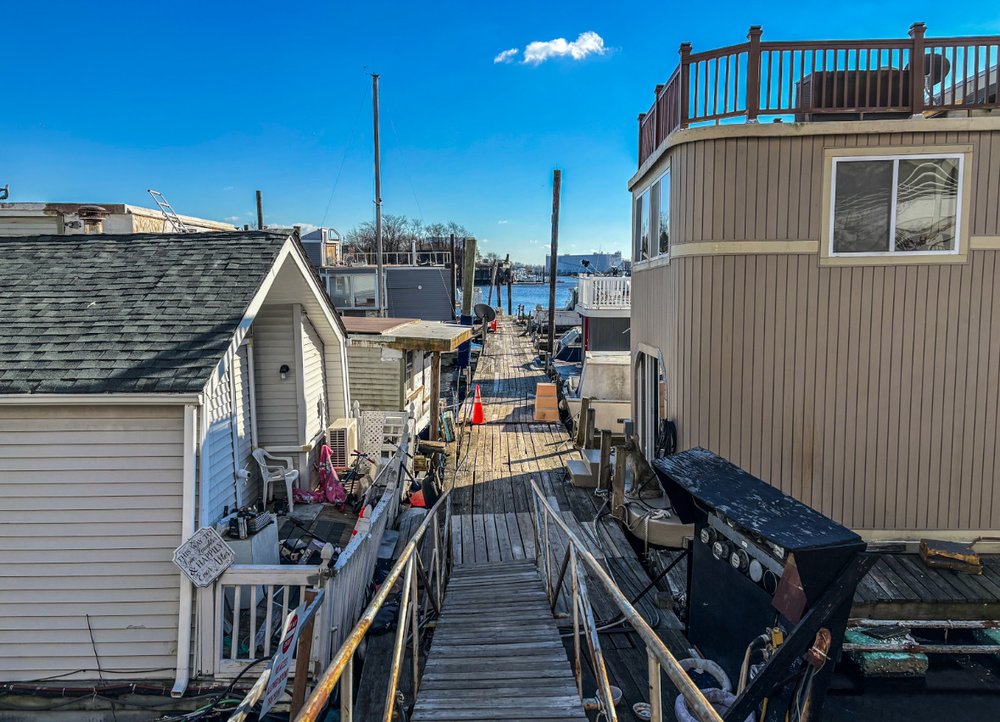A New York City housing crisis, both on land and at sea
Jan. 20, 2025, 7 a.m.
A houseboat community nestled beside a Brooklyn mall faces eviction, part of a dwindling number of New Yorkers who live on the water.

As Barry Green tells it, his 47-foot houseboat was a hunk of junk rotting away at a South Jersey marina when he bought it. He completely rebuilt it, insulated its interior, and had it towed to a dock beside Brooklyn’s Kings Plaza mall 12 years ago.
He found a community among other houseboaters moored at the marina in Mill Basin, along with a refuge from skyrocketing rents for apartments on dry land. Now, however, he and other houseboat owners are being told to shove off. Mall executives decided to evict them last year, citing a plan to renovate the marina after its agreement with a prior dock operator ended.
“They own the dock. We own the boats,” Green said. “It’s, ‘Pick up your boat and go someplace else.’”
The problem, he said, is “there really isn’t any place else to go” — especially for an 80-year-old retiree living on about $1,300 a month in social security payments.
Those facing eviction can’t easily move their floating homes. Even if they could, the number of “liveaboard” docks where people can live on houseboats are dwindling across the five boroughs. And, in a nautical version of supply and demand, rents are rising at the marinas that still allow full-time residents. Prices are spiking on land, too.
“You look in the papers and it says affordable apartments for $2,000 or $3,000 a month,” said Green, who was paying around $700 a month to rent the slip at Kings Plaza under previous management. “This is affordable? For who?”
There is no official tally of New York houseboats. The city’s housing, transportation, parks, environmental and small business agencies say they don’t keep track. The parks department bans “liveaboards” from city-owned marinas and in 2021 evicted the few remaining houseboat residents from a deteriorating dock on the Hudson River at West 79th Street.

Residents, experts and historians say the number of houseboaters continues to decrease.
“ People are looking for another marina and it's hard to find one,” said Linda White, a retired letter carrier who has lived in a large houseboat at Kings Plaza for the past 14 years. “And the ones that will take you, they're expensive.”
Gothamist contacted 15 marinas across all five boroughs to see if they accept full-time residents. Representatives from each said they prohibit “liveaboards,” though one said they look the other way for longtime residents.
Most said they cut off water and electricity during the winter, or require members to remove their boats during the coldest months. Some boaters find safe harbor in inland waterways, like Newtown Creek, which courses through Brooklyn and Queens, and Westchester Creek in the Bronx, or keep a low profile in spots that officially ban full-time residents.
In legal papers filed last year, Kings Plaza General Manager Emma Dawson informed the houseboat residents they have to leave due to “a scheduled renovation of the Marina.” Another company had been leasing the facility from Kings Plaza and renting out the slips to the boaters until late 2023. When that agreement ended, the houseboat residents lost their right to remain at the marina, Kings Plaza’s attorneys wrote in six eviction lawsuits.
The commercial eviction cases are still moving through Brooklyn Civil Court and the residents do not have attorneys.
Dawson did not respond to questions from Gothamist and instead referred an email and phone call to the mall’s parent company Macerich, a retail real estate behemoth that owns at least 40 shopping centers across the country. Macerich spokesperson Denise James said the company declined to comment and that she had no information about why mall executives wanted to remove the houseboat residents from the dock.
New York City’s Economic Development Corporation asked businesses to submit proposals for redeveloping two waterfront lots near Kings Plaza last year, but a spokesperson said they have no involvement or information regarding the mall’s plans.
Evictions would unmoor the close-knit community of more than a dozen people, where residents said they chase away vandals, keep one another safe by making sure the gangway gate is locked, and check in on sick neighbors.

The marina and others like it around the city attract self-sufficient New Yorkers with an adventurous side. White, the retired letter carrier, said she and her husband decided to move in 14 years ago because they were in search of “something new.”
“It looked kind of exciting. And the first time you live on it, you're like, ‘Oh my god,’ because it's moving back and forth and it's up and down,” she said. “You get used to it.”
She now worries they may have to return to land. White said she has been unable to find another marina willing to accept her 52-foot barge.
Green’s houseboat is more like a floating workshop, brimming with his artistic and functional creations in wood, steel and leather. Shelves he built along the walls are lined with dozens of plastic containers filled with fasteners. Drawers are crammed with tools, like the chisels he uses to carve designs into an 8-foot-long plank covering a gap in the ceiling. He showed off some of his artworks: an intricate lock and an ornate, dragon-shaped steel dagger in a handcrafted leather scabbard.
“If I want to pound on metal at 3 o'clock in the morning, and you're living in an apartment, this doesn't work very well,” he said.
Elsewhere in the country, cities and towns from Portland, Oregon to Portland, Maine embrace “floating homes.” Boaters and maritime experts say that’s no longer the case in New York City, despite its 520 miles of shoreline and rich maritime history.
Barbara Dolensek, the vice president of the City Island Historical Society and administrator of the City Island Nautical Museum, said “plenty of people” were living on boats in the Bronx when she and her husband arrived in 1976.
“Now, I don’t believe there’s anyone living aboard,” she said.
Robert Johnson, an 89-year-old houseboat resident and boating historian living on the Bronx’s Westchester Creek, said he has seen rents triple in the city’s few remaining marinas in recent years. A new landlord doubled his own rent four years ago.
Houseboat communities are “considerably diminished” compared to two decades ago, Johnson said. “I would say almost disappeared.”
White, the retired letter carrier, said the city is losing an important source of affordable housing for hearty New Yorkers with a taste for unconventional living arrangements.
For the Kings Plaza residents, it means uncertainty and a community set adrift.
“The thing that's a shame is that you can buy these. They’re affordable,” White said. “I don't see why you can't live on them.”
Hochul pledges to close security deposit loophole for New York tenants After latest NYC real estate controversy, councilmember calls for fresh look at city brokers Turkish consulate at heart of Mayor Adams indictment still lacks crucial safety approvals